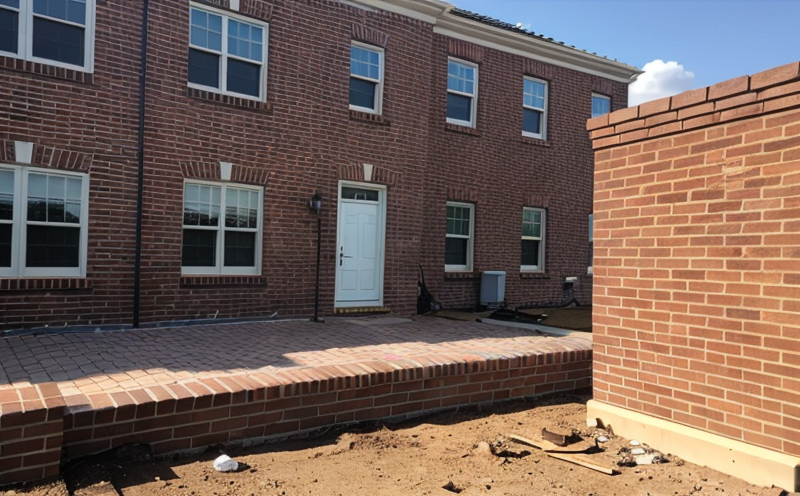ASTM C216 Freeze Thaw Resistance Testing
The ASTM C216 freeze-thaw resistance test is a critical procedure in the evaluation of masonry and brick materials, particularly those intended for use in harsh environmental conditions. This test assesses the durability of materials by simulating the effects of freeze-thaw cycles, which are common in regions with significant temperature fluctuations between freezing and thawing.
The test follows strict guidelines laid out in ASTM C216-20 Standard Practice for Conducting Freeze-Thaw Resistance Tests on Masonry Units. The procedure involves placing specimens of masonry units into a freeze-thaw chamber where they are subjected to cycles of immersion in water followed by freezing and thawing. This process is repeated until either the specimen fails or a specified number of cycles have been completed.
Specimens are typically prepared from bricks or other masonry units, ensuring that they represent the actual materials used in construction projects. The testing apparatus includes specialized freeze-thaw chambers capable of maintaining precise temperature and humidity conditions. Specimen preparation is critical; specimens should be dried to a specific moisture content before being immersed in water for freezing.
The primary goal of this test is to identify potential weaknesses or vulnerabilities within the masonry units that could lead to degradation over time, especially under fluctuating climatic conditions. By identifying these issues early on during development and manufacturing stages, architects, engineers, and construction professionals can make informed decisions about material selection and design.
Understanding freeze-thaw resistance is crucial for ensuring long-term performance of buildings and infrastructure projects built with masonry materials. It plays a vital role in predicting the expected lifespan of structures exposed to cold climates or frequent water exposure. This knowledge helps prevent costly repairs or replacements later down the line, thereby enhancing overall building sustainability.
For accurate results, it's essential to follow the ASTM C216 procedure closely and ensure proper specimen preparation and chamber conditions. Properly conducted freeze-thaw testing provides valuable insights into how well different masonry units perform under extreme weather conditions, allowing stakeholders to choose the most suitable products for their specific applications.
In summary, ASTM C216 Freeze-Thaw Resistance Testing offers a reliable method for assessing the durability of masonry materials against freeze-thaw cycles. Through rigorous testing protocols and precise specimen preparation techniques, this service ensures that only high-quality products are used in critical construction projects.
Eurolab Advantages
At Eurolab, we provide comprehensive ASTM C216 Freeze-Thaw Resistance Testing services tailored to meet the needs of quality managers, compliance officers, R&D engineers, and procurement teams. Our state-of-the-art facilities and experienced technical staff ensure accurate and reliable test results every time.
- Accurate Results: Utilizing cutting-edge equipment and adhering strictly to ASTM C216 standards guarantees precise outcomes.
- Comprehensive Reporting: Detailed reports are provided, offering insights into both the strengths and areas for improvement of tested materials.
- Expert Staff: Our team comprises highly qualified professionals with extensive experience in masonry testing.
- Client-Centric Approach: We work closely with clients to understand their specific requirements and deliver customized solutions.
We pride ourselves on providing not just tests but also valuable recommendations based on our findings. By leveraging this expertise, we help ensure that only the best materials are selected for use in your projects, ultimately leading to more resilient structures.
Environmental and Sustainability Contributions
- Reducing Waste: Proper freeze-thaw testing helps identify substandard materials early on, reducing waste associated with poor quality products entering the market.
- Promoting Durability: By selecting frost-resistant masonry units through rigorous testing, we contribute to longer-lasting buildings and infrastructure projects, minimizing maintenance costs over time.
Masonry structures subjected to freeze-thaw cycles without adequate resistance can suffer from spalling or crumbling. Early detection of such issues allows for corrective actions before they become significant problems. This not only extends the life span of buildings but also reduces the environmental impact associated with premature replacement or demolition.
| Test Parameters | Acceptance Criteria |
|---|---|
| - Specimen Size: 2 in x 4 in x 8 in (51 mm x 102 mm x 203 mm) | - No visible damage after the specified number of cycles or until failure. |
| - Initial Moisture Content: | - Typically between 6% and 9% by weight. |
| - Freeze-Thaw Cycles: | - A minimum of 100 cycles is standard, though higher numbers may be specified depending on project requirements. |
Through these stringent testing methods and adherence to industry standards like ASTM C216, we contribute significantly towards promoting sustainable practices in the construction sector. Our commitment to accuracy and reliability ensures that only high-quality masonry materials are used, ultimately fostering a greener built environment.
Use Cases and Application Examples
- Cold Climate Regions: Structures located in areas with frequent freeze-thaw cycles require frost-resistant materials to ensure longevity. ASTM C216 testing helps select appropriate masonry units for these environments.
- Marine Environments: Buildings close to coastlines often face exposure to saltwater, which can accelerate the deterioration of masonry over time. Freeze-thaw resistance tests are crucial for ensuring that materials used in such locations withstand harsh conditions.
The following table illustrates some common use cases where ASTM C216 testing is particularly beneficial:
| Use Case | Description |
|---|---|
| Cold Climate Regions | Structures in areas experiencing significant temperature fluctuations. |
| Marine Environments | Buildings near coastlines exposed to saltwater. |
| High Traffic Areas | Locations with frequent pedestrian or vehicle movement, increasing stress on masonry surfaces. |
| Sensitive Infrastructure | Critical structures like bridges and dams where failure could have severe consequences. |
In these scenarios, freeze-thaw testing ensures that the chosen materials can withstand expected environmental challenges, thereby enhancing structural integrity and durability. Properly conducted tests are essential for maintaining sustainable practices in construction by reducing waste and promoting the use of high-quality products.





